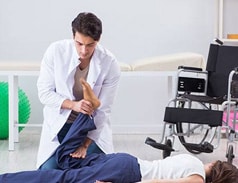I’m sure you have heard the term slipped disc before. You may have even been told before that you have “slipped a disc in your spine”. This sentence can create a lot of worry and fear, and it leads us to a perception that discs are fragile structures, easy to slip out of place and cause severe pain. The good news? Disc’s don’t actually slip…ever. Let me explain why. Between each of the vertebrae in your spine, there sits a disc. This consists of two parts; a strong cartilaginous ring on the outside called the annulus fibrosis, and a softer centre called the nucleus pulposus (you can picture it a bit like a jelly doughnut!). These discs are strong, flexible and help with movement and shock absorption. The discs are anchored to the vertebrae by ligaments. This connection is exceptionally strong and makes it impossible for the disc to actually slip out of place.
So what actually happens with a disc injury?
Disc injuries can occur for many reasons including trauma, overuse, poor posture or simple wear and tear through the spine (often called degenerative disc disease). If there is too much pressure on the outside of the disc or the cartilage has begun to degenerate, the inner substance of the disc (the nucleus) has the potential to push out and distend the disc. This is called a bulging disc. If the inner nucleus breaks through to the outside of the disc, it is called a herniation. Symptoms of these injuries can include local and referred pain, tingling, numbness or even weakness into the leg if there is any nerve compression.
So what do we do about it?
Left on their own, discs DO usually heal, however without proper treatment, they may not heal correctly, leading to reduced movement of this spinal segment and increased pressure on neighbouring segments. There are many things we can do to help them heal correctly, including reducing your soft tissue spasms, mobilising your spine, getting your core muscles firing properly and improving your posture. It is important to get on top of your injury as soon as possible to reduce the risk of re-injury.
The final advice?
Don’t believe anyone that has told you you’ve “slipped your disc”! Should you ever worry you have injured your discs, book in for an assessment so you can get the right information and rehabilitation plan to help get you back on track.
Miami Physio : 9534 4111
Lakelands Physio: 9542 9999

